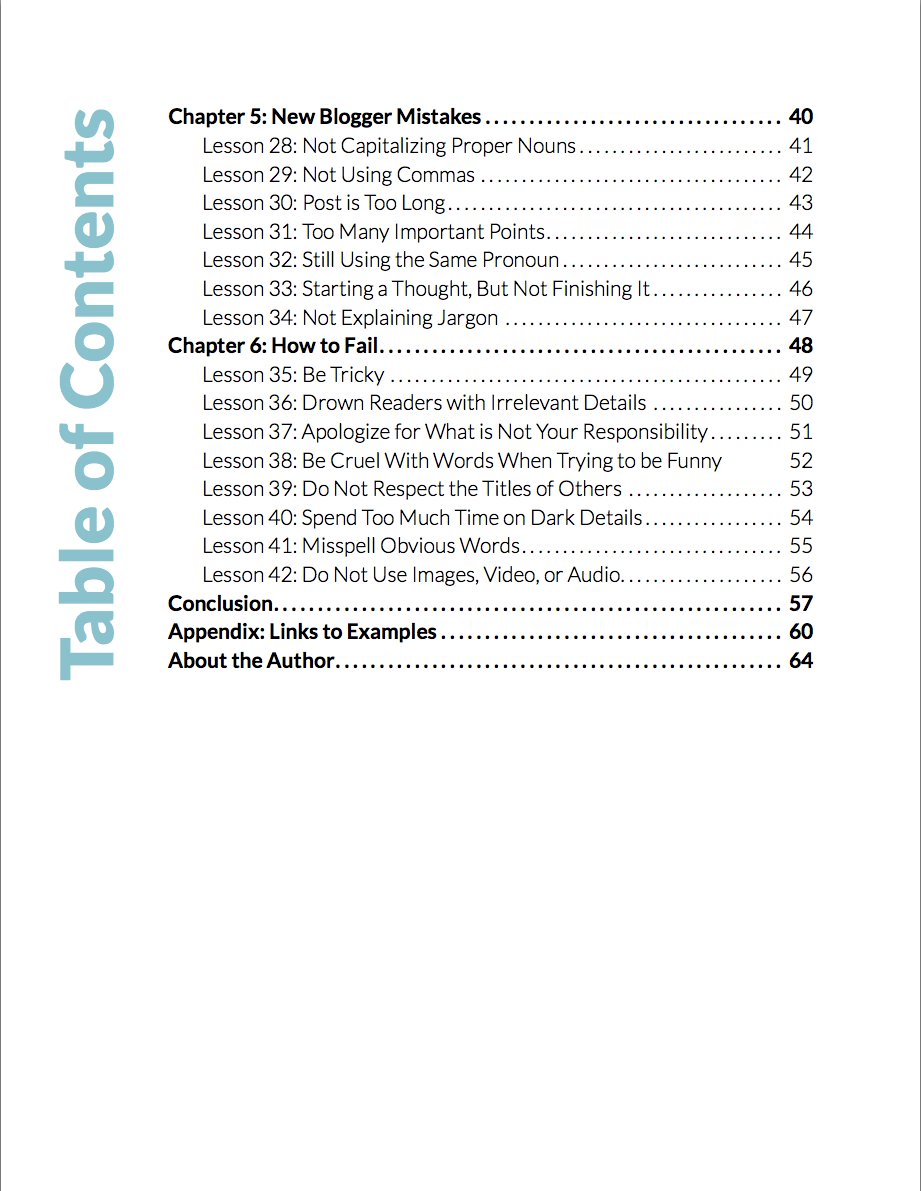Does your homeschooler DREAD writing?
- She’s not interested in the topic.
- He’s too hung up on grammar and spelling.
- Writer’s block stops him.
- She knows that only a few people will read it.
Rescue your student from feelings of discouragement and hopelessness!
How?
Have your students:
WRITE AND BLOG DAILY ABOUT THE GROWTH IN THEIR TALENT
This does not mean casual blogging about whatever comes to mind, but rather blogging with a purpose and future in mind.
Why?
- Your daughter gets instant gratification from sharing something newly learned.
- Your son is building his online portfolio that can turn into opportunities in the future.
- He’s tracking his progress in all areas of his talent development.
- She’s integrating math, science, and history into her talent development, suddenly awaking a passion for areas that seemed irrelevant before.
- Their parents and relatives have access to their progress.
When?
Now! Choose the program that best suits your needs:
SILVER LEVEL PACKAGE  |

|
GOLD LEVEL PACKAGE  |
PLATINUM LEVEL PACKAGE |

|
What you can expect from the the Silver Level Package e-course “Blog to Your Talent”
This easy to follow e-course will walk your child in 42 lessons through the start-up of a personal blog dedicated to documenting his talent.
The forward and introduction are written directly to the parents (or to older teenagers), but the lessons themselves are crafted specifically so that the young men and young women, all the way down to age 12, can do them entirely on their own without parental assistance.
Your child will have 40 blog posts up on the Internet when he is finished with this e-course.
If your child can benefit from one-on-one direction, I recommend the Gold Level Package or the Platinum Level Package. Those premium levels allow me to give personal feedback on individual posts and some personal coaching.
Who is this guide for?
If you want your child’s talent to be discoverable even while still living under your roof, then this guide is for you.
If you want your child to be able to connect with experts from around the world in his field of interest, then this guide is for you.
If you believe that your child’s ability to communicate about his talent is as important as the talent itself, then this guide is for you.
If you want your child to learn to write with passion and focus about something that he cares about, then this guide is for you.
If you want your child to build a portfolio of hundreds, and eventually thousands, of documented evidences of his talent, then this guide is for you.
If you want your child to build his own unique voice within the context of a larger field of talent, then this guide is for you.
Who is this guide not for?
This guide will NOT be of help to your child if:
- your child does not currently have an interest in any particular talent or skill (instead have your child first discover a beginning talent by downloading my e-course “How to Discover and Develop Your Child’s First 100 Hours of Talent“)
- your child does not have your emotional support to pursue a talent of his own as seriously as you want him to pursue his regular school curriculum
- you do not believe a child is capable of developing a long-term appropriate talent and passion until after he leaves home
- you believe that writing literary essays is the same as learning to communicate within a specific field of talent
- you believe that full-blown talent of any kind must be a gift bestowed upon your child at birth or else not bothered to be pursued at all
- you just want your child to have fun with a hobby or a quaint skill that you wouldn’t expect him to continue as an adult
Blog to Your Talent
Table of Contents
…[sample lesson]…
Sample Lesson 4: Trains Your Writing to Have Purpose
Blogging about an aspect of your talent interest will cause you to focus on the style of your writing. Not writing about your talent, but writing about other things that don’t really matter to you causes you get sloppy. Being sloppy means it is easy to be indifferent about the choice of your words as it is not even clear to yourself what you intend to mean, let alone to others.
But because you care about your talent passionately, you will instinctively want to make sure that what you say is exactly what you are intending to say. As a result of that focus, you will be constantly editing, practicing, and developing a style that fits the purpose of your blog. Because you care, you will find motivation easy . This is what blogging about your talent can do for you.
Take Action
Writing should not be done mechanically without a sense of style, but developing style can take time. To get you there faster, get inspired and look closely at the writing style of a blogger you follow.
Write a blog entitled “I like [name of blogger’s] style” and explain which part of that blogger’s style you would like to emulate.
See this idea in action
I like this blogger’s style:
http://thecoinchat.com/2013/06/14/i-like-vsauces-style-of-vlogging/
…[excerpt from the Introduction]…
What You Can Expect with this Guide:
The “Blog to Your Talent” e-course is a practical manual
for a student on how to start writing a blog to
demonstrate his growing talent. It includes 40 practical exercises that
will each result in an immediately publishable blog post. For ease in
reading, you will find all references to the student as he/his/him.
Blog to your Talent is to be used by young people ages 12 to 18
who already have an on-going interest or talent focus in their lives.
The student does not need to be very proficient at his interest and
may even be a complete beginner, but it is necessary that there be
a subject, a skill, or a talent that is already occupying his mind. It is
this subject matter that will provide the fodder for him to write blog
posts that matter to him and others. This means that without a talent
focus, this e-course will not work for your student. You should first
download my free e-course entitled How to Discover and Develop Your
Child’s First 100 Hours of Talent. Once you’ve established at least a
general interest that you think will cause him to engage in vigorous
conversations or activities, then this guide is ready-made for that
young person to take his interest to the Internet.
Students on the younger side of the 12 to 18 years of age continuum
who have never blogged before will find all these exercises
stimulating, novel, and definitely do-able, even if they are minimally
able to write basic notes to friends and relatives. Older sons and
daughters who are closer to graduating from home and who may
have already dabbled in some blogging will find all these exercises
very easy to accomplish, yet challenging in a different way than their
younger blogging counterparts.
Expect that this guide will challenge some of the schooling habits
that older children have accumulated over the years. The approach
to writing posts for a blog is very different from the typical essay
assignments they have been taught in their traditional courses. We
are still at a juncture in time where the power of the blog has not
been fully assimilated as a communication tool in its own right. Just
as it would be silly to communicate on the phone today with a friend
Introduction in the same way you would communicate to him via a handwritten
letter, it would be just as frustrating for the audience of a blog if they
were forced to wade through posts that sounded and looked like
school essays. Instinctively you know that, but you may not be able to
put your finger on the reasons why.
Enter this guide.
I will arm your student with reasons why he should not copy
traditional essay writing and I encourage you the parent to peek into
the first chapter to arm yourself as well. Chances are, you are already
Internet-savvy and know how disconcerting it can be to read posts
from a blogger who has not learned to write within the new medium.
The content may be good, but if the format is wrong, you will
probably abandon reading that blog over time. The danger is that we
can be so conditioned by past school expectations, that we are
blind-sided by the potential this same medium can have in our
own lives, not simply as consumers of information, but as productive,
intelligent producers of information that have value for others in
addition to themselves. A blog should be intended for production
which is why with this manual, your student is going to hit the
ground running in a way that will give him immediate satisfaction,
while setting him up for a systematic way to be productive after
he’s finished this course.
The goal of this course is to boost your student’s confidence in his
ability to communicate about his talent. He will discover that
when he writes with a purpose in mind, it makes all the difference.
…[excerpt from the Conclusion]…
Congratulations! You have finished this e-course on how to blog
to your talent and you should now have in the neighborhood of
up to 30 posts published to the world. This is very exciting and no
small feat. Most students your age will never reach near that level
of productivity around a single subject focus. So by now, you are
probably sensing a writing groove of your own. Maybe you have even
come up with a few new writing tricks and techniques that you are
dying to share with others. If so, I would love to hear about them.
Email me your ideas at jonathan@10ktotalent.com and I will respond
back to you personally.
So where do you go from here? First of all, more blogging of course!
But beyond that you will have to also decide in which specific
direction to take the content matter of your blog. Within each
field, there are many sub-specialties, and you cannot cover them
all. It is most likely that over time, your energy and skills will focus
on an even more specific area than you are covering now.
Consequently your blog style will change over time. That’s good. You
want your blog to change with the changes that are working for you
in the pursuit of excellence within your field of talent.
You may also want to consider starting a second or third blog as a
spinoff to this first one. This will be the case when you realize that
this talent that you are building from scratch will be composed of
sometimes very different skills. Different skills will naturally attract
a different audience with different expectations in the way you
communicate. For example, famous athletes will often share that the
secret to their prowess is due to the fact that they will develop their
muscle strength under the tutelage of expert body-builders on some
days, but then go back to their regular football coach on other days.
In that case, if you were an aspiring professional football player, it
may make sense to have one blog about football and another blog
about body-building techniques. In this way, you can give each skill
within your talent the communication format it deserves.
Finally, you might also decide after some time of blogging that
the subject matter you are writing about is really not what you are
interested in. This can happen for good reasons and not because
you’re a quitter. As long as you are not giving up simply because it
is a little difficult, then it makes sense to use that experience to get
advice from your parents as to what type of talent you really do want
to pursue in life. Either way, whether you continue with the blog
or decide to terminate it, you will be that much more self-aware
of what you need to do to get to that next serious level of long-term
commitment in your life.
Once you have blogged your 100th post, I hope you will also then
take the time to send me a note so I can celebrate with you. I want to
leave you an encouraging comment on your blog. That will also be
the time to start thinking about ways to gradually modify your talent
so you can bring value to others through the application of your
talent. I hope to converse with you then and give you a blueprint for
discovering value and blogging about you giving value to others
through your talent.
Until then, happy talent journey!
SILVER LEVEL PACKAGE 
- e-Guide BLOG TO YOUR TALENT
- 30 Videos
GOLD LEVEL PACKAGE  |

|
PLATINUM LEVEL PACKAGE |

|



